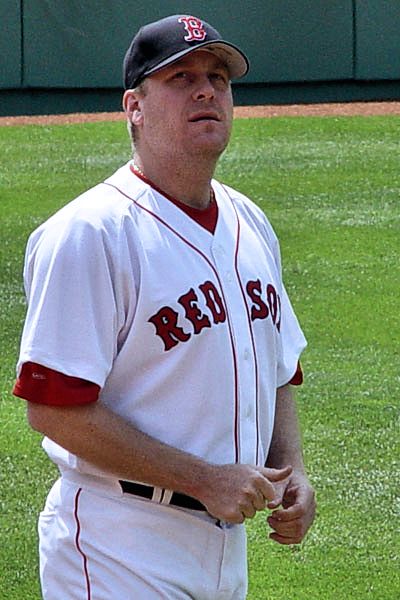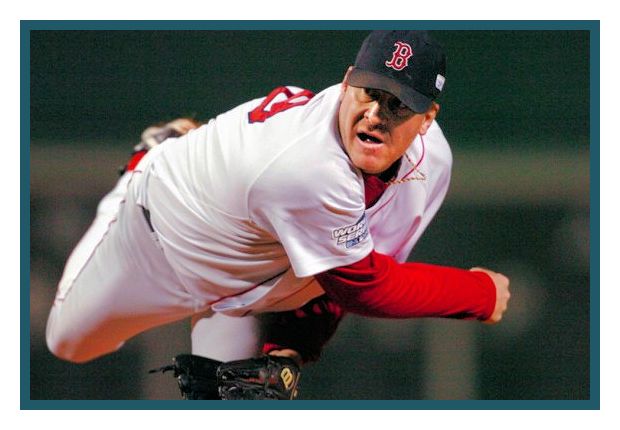|
“FENWAY'S BEST PLAYERS”  |
|||||
Born Curtis Montague Schilling in Anchorage, Alaska, Schilling was raised in Phoenix, where his father, Cliff Schilling, served in the Army and passed along his love of baseball. Enrolling at Yavapai Junior College in Prescott, Arizona in 1985, he pitched for the school team, then signed with the Boston Red Sox as a second round draft choice in 1986. Traded to the Baltimore Orioles in 1988, Schilling made his major league debut in September, the occasion a poignant one due to the recent death of his father. Only a year before, Cliff Schilling had been diagnosed with brain cancer, and in January of 1988, just a few months before Curt's major-league debut, his life support was finally removed. When Schilling took the mound for the Baltimore Orioles, he reserved an empty seat for his dad, as he had for the thirteen years during which his father had been his most loyal fan. Although mounting a lackluster record with the Orioles, Schilling showed promise, and during the 1990 season he chalked up an ERA of 2.54 as a middle reliever. In 1991 Schilling moved to the Houston Astros where he pitched 75 innings during a season that left him with three wins and five losses; in Texas he received a further attitude adjustment from Red Sox star Roger Clemens and started to perfect his game. Traded to the Philadelphia Phillies in early 1992, he showed his potential by pitching twenty-nine straight scoreless innings. The year 1993 was a good one for the Phillies, fueled by Schilling's 95-mph fastball and his 16-7 record as a starter. The team made it into the World Series against the ultimately triumphant Toronto Blue Jays, following a 4-2 win over the Atlanta Braves in the Eastern division playoffs. Despite his team's loss to Toronto, Schilling was named 1993 National League Championship Series MVP. In 1994, the Phillies hit a slump, and Schilling followed suit with a 2-8 record and an ERA of 4.48. In 1995, during which the Phillies ranked third in their division. He began 1996 on the disabled list, then returned to the mound throwing 97 mph after extensive rehab. Still, the Phillies remained in a slump, ending the season in fifth place. Although Schilling topped his career average and set a new league record for strikeouts by a right-handed pitcher in 1997, with 319, as well as going 17-11 with a 2.97 ERA, the Phillies remained in the doldrums. Frustrated by his team's inability to turn things around, Schilling continued to wait it out, and was rewarded in 1998 when the Phillies finally climbed out of the hole to settle in third place in the Eastern division. He also received his second consecutive invitation to pitch in an All-Star game. In 1999, Schilling pitched in his third All-Star game, this one in Boston's Fenway Park, but by season's end he was once again disabled. He underwent arthroscopic surgery on his right shoulder in December 1999, and was well on his way to recovery the following February when his wife was diagnosed with a potentially lethal melanoma. Strong enough not to let his concern for his wife overshadow his responsibilities as a player, Schilling continued to develop his career. In July of 2000, now into his final season under contract with Philadelphia, Schilling was traded to the Diamondbacks. Although his first months with Arizona proved disappointing—he had 5 wins and 6 losses with a 3.69 ERA—he signed on for three years with Arizona after the 2000 season was over. In addition to supporting Shondra while she dealt with her cancer, he worked to hone his skills. Schilling started the 2001 season strong, pitching 7.1 perfect innings during a May match with San Diego. He ended the regular season 22-6, with 293 strikeouts, and was ranked second in the league's ERA and strikeouts, going on to win all three starts in the National League play-offs. With Schilling and Randy Johnson, the Diamondbacks suddenly found themselves with an almost unbeatable pitching machine that rated comparisons to 1960s tandem pitchers Sandy Koufax and Don Drysdale. After a win against Atlanta propelled them into the 2001 World Series and a seven-game win over the New York Yankees, Schilling was voted Johnson's runner up for the National League's prestigious Cy Young Award from the Baseball Writers Association of America, and was top choice for co-MVP. Once again on the Arizona mound in 2002, Schilling pitched a minimum of six innings in each of his twenty-six starts and seven or more innings in twenty-three starts. Continuing the trend of the year before, teammate Johnson won his fifth Cy Young honor, with Schilling runner-up for the second consecutive year. In November 2003, the Diamondbacks traded Schilling to the Boston Red Sox. The trade to Boston reunited Schilling with Terry Francona, his manager during his final four years with the Philadelphia Phillies. On September 16, 2004, Schilling won his 20th game of 2004 for the Red Sox, becoming the fifth Boston pitcher to win 20 or more games in his first season with the team, and the first since Hall of Famer Dennis Eckersley in 1978. Schilling ended his regular season with a 21–6 record. His 2004 Game 6 ALCS performance with a sutured tendon dressed in a bloody sock was the defining image in one of baseball's all-time playoff comebacks and an inspiration in overturning an 86-year old World Series drought. Despite being one of the most outspoken and opinionated players in the game, his on-field performance rose when it mattered most. During postseason play, he went 11-2 with a 2.23 ERA and garnered World Series co-MVP and NLCS MVP awards. For his career, he recorded 216 wins and 3,116 strikeouts while only walking 711. The Red Sox acquired Schilling to gain another top-of-the-line starter after their previous season once again ended in heartbreak against their vaunted rivals -- an 11th-inning Game 7 loss to the New York Yankees in the ALCS. Within his contract, Schilling negotiated a $2 million salary bump if he helped the team win the World Series, to go along with an extra year at $13 million. "I guess I hate the Yankees now," Schilling said after being introduced. In his first season with the Red Sox, Schilling led the AL with 21 wins and had a 3.26 ERA. For the third time, he finished second in Cy Young voting -- this time behind Johan Santana. The Red Sox again faced the Yankees in the ALCS. The Red Sox lost the first three games and faced an incredible obstacle -- no team in MLB history had come back from a 3-0 deficit in a seven-game playoff series. After the Red Sox won Games 4 and 5, Schilling took the mound in Game 6 at Yankee Stadium despite a displaced tendon in his ankle that had to be held together by sutures and which required off-season surgery. With blood soaking through the sock while he was on the mound, Schilling pitched seven innings, allowing only four hits and one run to send the series into a Game 7. When the Red Sox won Game 7, 10-3, they pulled off one of the greatest comebacks in sports history -- Schilling's Game 6 performance serving as the series' inspirational moment. The Red Sox swept the Cardinals in the World Series to win their first championship in 86 years. Schilling pitched Game 2 of that series -- with the help of the same ankle procedure -- and went six innings without allowing an earned run. But Schilling's playoff performance took a toll on the rest of his career. In 2005, he started only three games in April before injuries held him out of action until mid-July. When Schilling returned, he was placed into a closing role, where he stayed until the end of August. Schilling was held out of postseason action, and the Red Sox were swept in three games in the ALDS by the Chicago White Sox. For the season, he pitched 93.1 innings, with a 5.62 ERA and nine saves. The following season Schilling bounced back to go 15-7 as a starter, with a 3.97 ERA. The Red Sox, however, went 86-76 and missed out on the postseason. In 2007 Schilling's career appeared to be coming to an end. The Red Sox weren't willing to negotiate a new contract with him, and there was some talk of retirement. While injuries hindered his regular season, he almost pulled off his first career no-hitter against the Oakland Athletics on June 7. With two outs in the ninth inning, Shannon Stewart lined a single into right field. At 40 years old, he would have been the fourth oldest pitcher to pull off the feat behind Randy Johnson, Cy Young and Nolan Ryan. In 151 innings on the season, Schilling went 9-8 with a 3.87 ERA and 101 strikeouts. Against the Angels in the ALDS, he pitched seven innings of scoreless ball and garnered a win. Against the Indians in the ALCS, he went 1-0 in 11.2 innings with a 5.40 ERA. In Game 2 of the World Series against the Colorado Rockies, he picked up a win by going 5.1 innings and giving up one run on four hits. That performance would prove his last major league appearance. The Red Sox swept the Rockies to win their second World Series in four seasons. Schilling signed a one-year deal with the Red Sox for 2008, but because of shoulder troubles didn't appear in a single regular-season game. During the off-season, he announced his retirement on March 23, 2009, on his blog. He retired as the only pitcher to win a World Series start for three different teams. In the regular season, he compiled a record of 216-146, 83 complete games, 3.46 ERA, 3,261 inning and 3,116 strikeouts. In the postseason, he went 11-2 with a 2.23 ERA with four complete games. As is evidenced by his decision to name his first son Gehrig, Schilling loves all things baseball, including memorabilia, and is an active student of the history of the sport. Together with his wife, Schilling also contributes to the battle against amyotrophic lateral sclerosis (ALS), a degenerative muscle ailment named for storied Yankee slugger Lou Gehrig, who died from the condition. Involved in the cause since 1992 when they began Curt's Pitch for ALS under the auspices of the Curt and Shonda Schilling ALS Research Fund, the couple have earned $1.5 million to fight the disease, and have also befriended ALS patients and testified before Congress to boost research. Due to the tragedies that have touched his family, Schilling remains active in efforts to remove smokeless tobacco from baseball and funding cancer research. In 1997, 1998, and 2001 he was honored with baseball's Roberto Clemente Award for balancing outstanding performance with civic responsibility, and has received numerous other public service awards.
|
|||||

